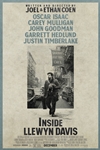Inside Llewyn Davis
The Coen Brothers’ latest film, Inside Llewyn Davis, focuses on an unlucky, occasionally unlikable folk singer in 1961 New York. Opening at the Gaslight Café, the camera looks at Llewyn (Oscar Isaac) as he plays “Hang Me, Oh Hang Me,” to an audience that tepidly receives his music. The owner of the café mentions that Llewyn’s friend is outside, so he checks it out, only to get beaten by a disgruntled man who doesn’t seem to have a face based on the lighting. There’s a tragedy to Llewyn’s character, and the manner in which he jumps from couch to couch; he has no home, no loved ones, and very few friends. Most are acquaintances that Llewyn hopes will provide him with help at some point. He isn’t exactly the friendly type, though. Staying at a professor’s place that he seems to be relatively close with, he mistakingly lets their cat, Ulysses, out of the apartment. That cat seems to embody the way in which Llewyn moves in and out of people’s lives, as he runs off at one point and doesn’t seem to return until he decides to.
Llewyn loves Jean (Carey Mulligan), a folk-singing woman who has a romantic past with him that has potentially led to her current pregnancy. She’s with Jim (Justin Timberlake), a kind man who hopes to make it big in the business; he records a song, “Please Mr. Kennedy,” that is one of the cheesiest and joyous recordings of the year (and one that Timberlake himself wrote for the film, which feels perfectly in sync with the mainstream fare that dominated that era). Jim is more accepting of Llewyn and wants to see him succeed, while Jean considers him a poison that refuses to make it far in the business because he doesn’t want it enough. There’s a compelling characterization within Mulligan’s apparent nagging: she loves Llewyn dearly, or at least used to, and she cannot bear to see him struggle with something that he clearly loves as much as any person. When Llewyn believes he found the cat that escaped earlier, he brings it in to the café where he’s talking with Jean; she smiles as he pours milk for his coffee onto a small plate for the cat. He cares about the animal, but is that out of love, or the obligation he has to return it?
There’s a selfishness to Llewyn and his actions that lends itself to an unlikable protagonist. Isaac creates an amicable persona around Llewyn and allows for the tragedies he faces to outweigh his stubborn manner; seeing the film a second time enhances the Coen Brothers’ meticulous nature about this character. Finding out that he has probably had multiple loves in his life, one of which lives in Akron now with a child, demonstrates the unlucky hand that Llewyn has been dealt. He takes a road trip with Roland Turner (John Goodman) and Johnny Five (Garrett Hedlund) to Chicago because of a show they are performing. What’s so striking about this sequence in the middle of the film is that it never leads to anything on their part, but acts as a means for Llewyn to reach The Gate of Horn and talk with Bud Grossman (F. Murray Abraham). Llewyn had his producer send this man his album, “Inside Llewyn Davis,” yet it never arrived; his producer never helped or paid him, adding to Llewyn’s tragedy. Upon finding this information out, Grossman asks Llewyn to perform for him: he does, and the scene becomes heaped in tragedy rather than triumph.
Llewyn used to perform with a partner, which lends itself to one of the film’s earliest and finest scenes. “Fare Thee Well,” sung by Marcus Mumford and Isaac himself, plays over a brilliant montage as Llewyn chases after the cat. The song repeats at various moments throughout the film with only Llewyn singing; his loneliness signifies his inner struggle. The film’s cinematographer, Bruno Delbonnel, captures the drained saturation of this man’s life, often emphasizing Llewyn’s lack of possessions and showcasing the beautiful art direction and costume design, both of which should not be overlooked. The performances all-around are spectacularly well-drawn, with Isaac providing a tenderly graceful, beaten approach to his sad sack of a character, and Mulligan and Goodman making the most of their incredibly limited screen time. The Coen Brothers emerge as remarkable filmmakers due to their knack of character-driven moments and dialogue; I don’t think I can name a better filmmaker at crafting both a perfectly blended visual palette and script. Inside Llewyn Davis is one of their finest works, and one of the year’s best films.










